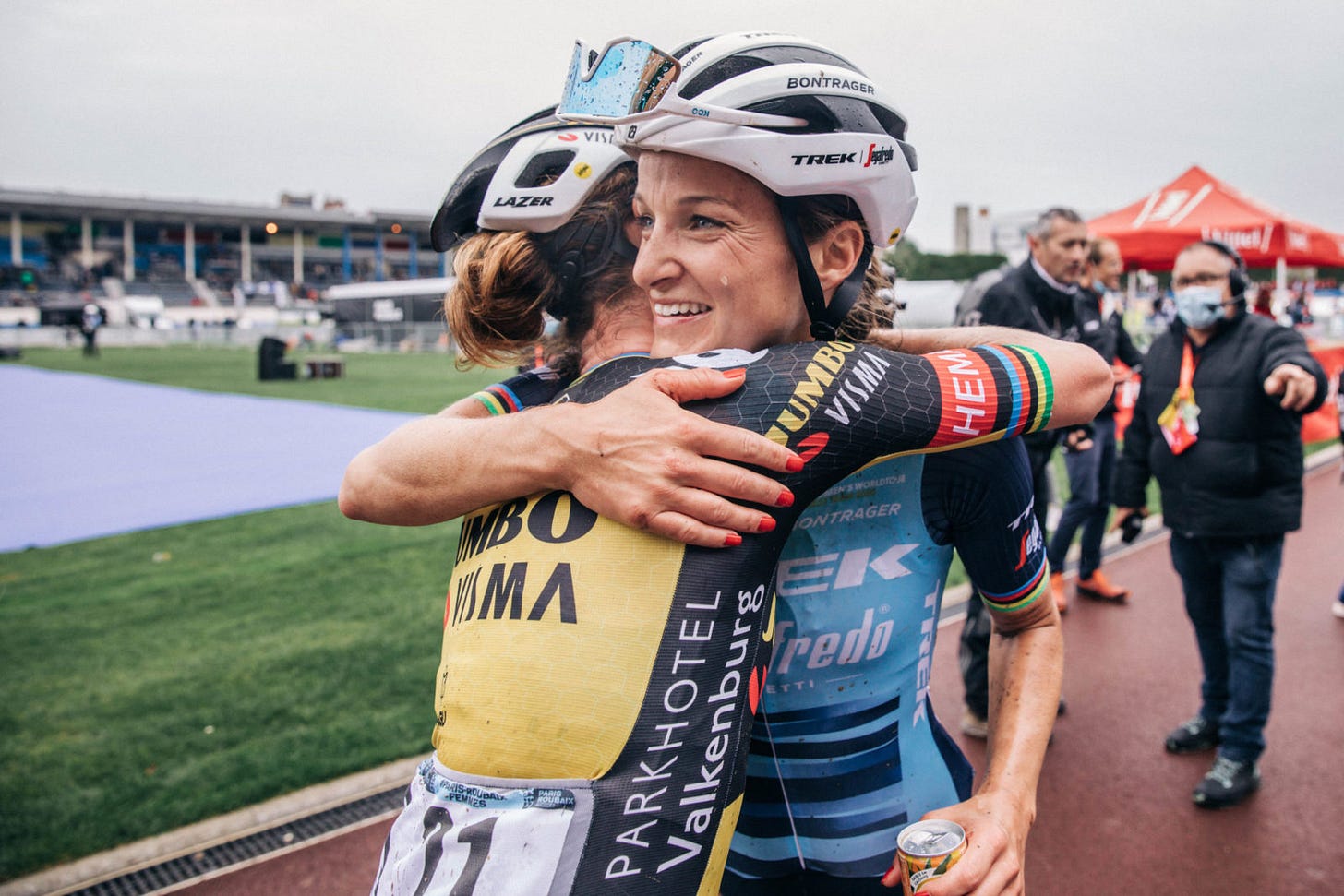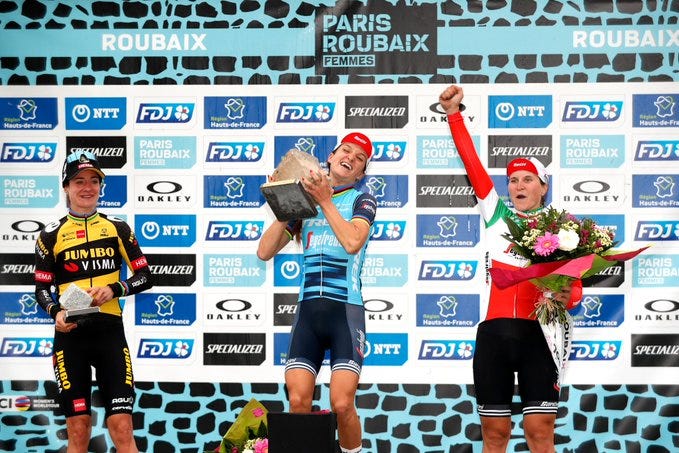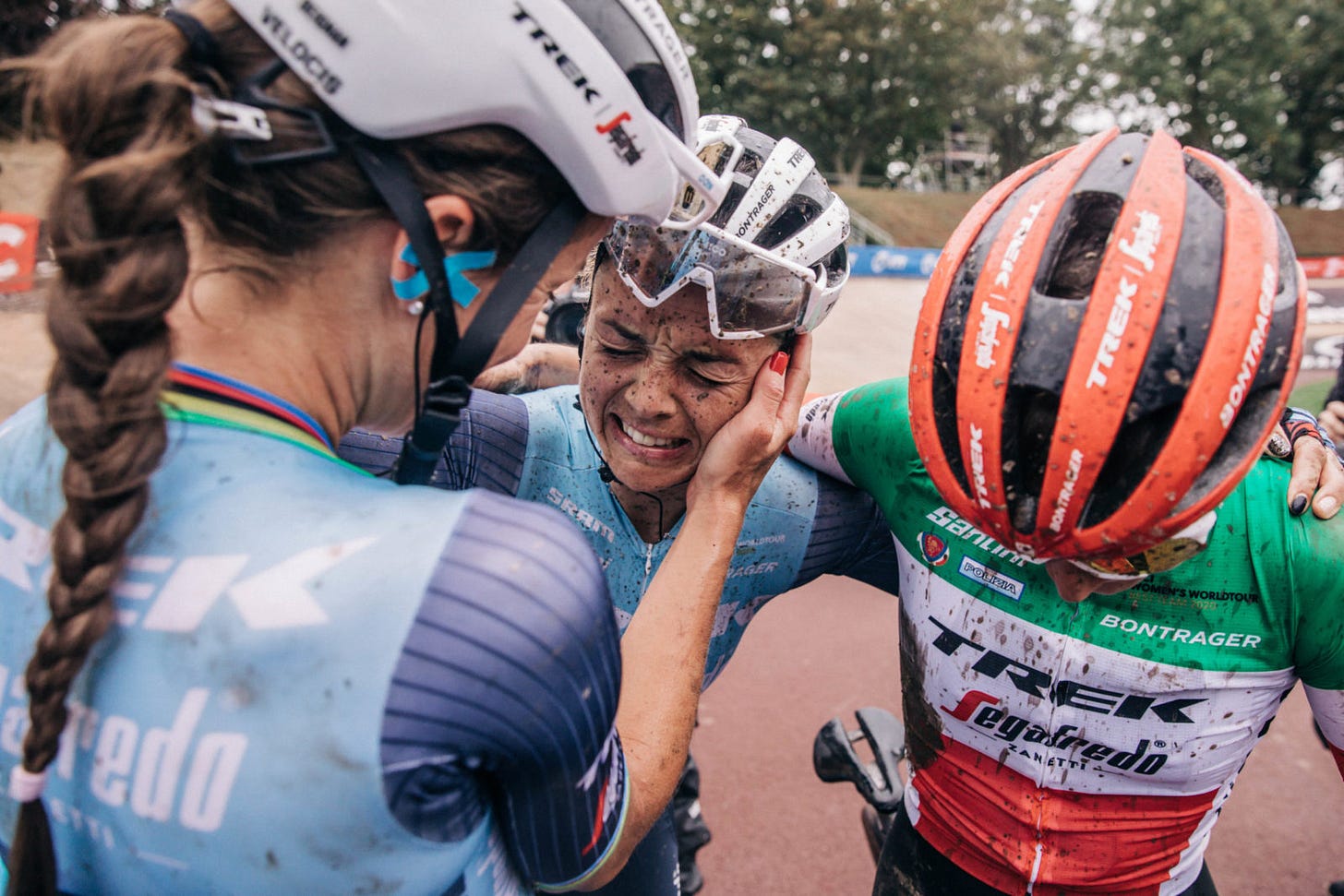Queen in the North
Paris-Roubaix welcomes its first, glorious womens' edition, with Lizzie Deignan taking the crown
Lizzie Deignan made history on Saturday afternoon.
She is, of course, fairly used to it. As Great Britain’s greatest ever one-day racer, she has accumulated titles with relish. For many, Deignan (née Armistead) will be synonymous with her silver medal at London 2012, pipped at the rain-soaked post by the greatest of them all, Marianne Vos. However, the Otley-born cyclist has amassed more than 40 wins of her own, often going wheel-to-wheel with the aforementioned Vos.
Last year, she pipped the Dutchwoman in a classic edition of La Course (for many years, the women’s peloton’s take on the Tour de France), and she has one of the most impressive palmarès in cycling. 2020 was a golden year, in which Deignan took victories at GP de Plouay and Liège–Bastogne–Liège. Four years previously, she won Strade Bianche and the Ronde van Vlaanderen, two of the most significant one-day races on the calendar, while in 2015, she became the road race world champion on the streets of Richmond, Virginia.

Put simply, Britain has never produced a one-day rider like Lizzie Diegnan. Yet while there was, rightfully, huge acclaim for Bradley Wiggins when he won the Tour De France in 2012, or when Mark Cavendish became the road race world champion in 2011, the reaction to Deignan’s triumphs has been muted.
Deignan’s victory at Paris-Roubaix Femmes was superb on its own terms. Attacking more than 80km from the finish, the Brit traversed the feirce, slippery cobbles which define the race with guile and skill. A post-race photo showed her handlebars caked in blood, so brutal is the terrain the peloton faced. Deignan has said previously that she cannot approach every single race with a single-minded focus, but when she is in the right head space, it is clear to see.
With 20km to go, it was beginning to look precarious. A solid chasing group had emerged, and her lead was dwindling. With only a few cobbled sections left to tackle, Marianne Vos decided to seize the initiative and hunt for Deignan. She flew across the cobbles, chewing into the British rider’s time, but it wasn’t enough. Deignan entered the Roubaix velodrome - the iconic finish to the race - alone, and rode the final lap and a half like an extended victory parade. Paris-Roubaix had its first female champion, and it was an undeniably inspiring first edition.

This inspiration is at least partly due to the simmering excitement which emanates from a sport on the up. Women’s cycling has grown hugely in the past few years, and produces consistently exciting, unpredictable racing. Increased funding in the sport has allowed a greater degree of professionalism, and it is a huge positive to see many of the ‘men’s teams’ commit fully to their women’s squads.
There is still a long way to go: the prize money for the women’s winner (€1,535) was paltry compared to that of the men (€20,000), and while Deignan’s team Trek-Segafredo should recieve plaudits for agreeing to pay the difference, this parity should have been baked in from the start. More broadly, it seems bizarre for Ineos Grenadiers not to invest in a women’s squad, given the superb depth of cycling in the UK, while the fact that only the second half of Paris-Roubaix Femmes was televised is jarring - but there are kernels of progress.

Coming 125 years after the first edition of the men’s race, Paris-Roubaix Femmes is long overdue. Similarly, next year we will see the women’s peloton given a multi-stage equivalent of the Tour de France. These progressions have been a long time coming, yet we can only move forward, and in the case of women’s cycling, this trajectory seems to be expontentially upwards. As with any social corrective, the progression is inconsistent, but it is truly inspiring to see a professional sport in its nascent stages.
Races like Paris-Roubaix are defined by their brutality and longevity. Indeed, the entire run of Classics in the men’s cycling calendar have recieved that moniker because of their folkloric endurance. How incredible then, to think of the 2071 edition of Paris-Roubaix Femmes, some fifty years in the future, when commentators, grizzled, aged fans and new, fresh-faced supporters will look back to the first edition, to the day when Lizzie Deignan went from afar and conquered the cobbles.



